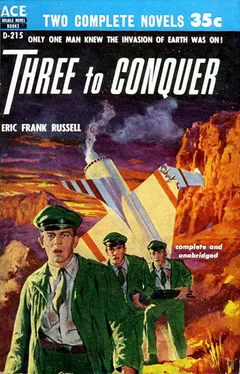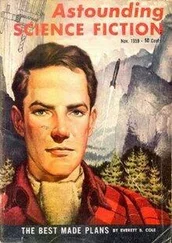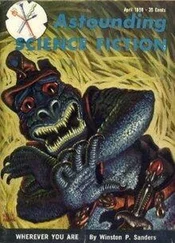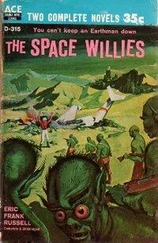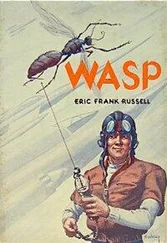“This is the Baum house,” said Norris, making it a statement rather than a question.
“That’s right,” she agreed. “But Mr. Philip and Mr. Ambrose aren’t here just now. I don’t know when they’ll be back.”
“They’ll never be back,” Norris told her.
Her wrinkled hand went to her mouth while she gazed at him in a thoroughly startled manner. “Has… something happened?”
“Unfortunately, yes. Are you a relative?”
“I’m Mrs. Clague, their housekeeper,” she informed them a little dazedly. “Are they—?”
“Any relatives living here?” interrupted Norris.
“Oh, no. They’re confirmed, bachelors, and have nobody related to them nearby. In this house there’s only the maid and myself.” She swallowed hard. “Are they hurt?—badly?”
“They’re dead. We’re law officers. We’d like to have a look around.”
“Dead?” She whispered it as she stepped backward and let Norris enter, with Harper and Rausch following. Her mind had some difficulty in grasping the full import of the news. “Not both of them surely?”
“Both, Mrs. Clague. I’m sorry.” Norris extracted three photographs from his wallet, showed them to her. “Do you recognize any of these men?”
She blew her nose, wiped her eyes, studied the pictures bemusedly. “No, I don’t.”
“Sure you haven’t seen any of them recently?”
“I’m positive.”
“Where’s this maid you mentioned?”
“In the kitchen. Do you wish to speak with her?”
“Yes.”
She called, “Winnie! Winnie!”
Winnie slouched in, a plump, ungainly girl with the placid eyes of a ruminating cow.
“Know these?” demanded Norris.
She ogled the photographs. “No, sir.”
“If any of them had visited here recently, would you or Mrs. Clague have been sure to have seen them?”
“Uhu. I guess so.”
The housekeeper put in, “Mr. Ambrose and Mr. Philip seldom had visitors. They used this house only for relaxation and sleep. And they kept late hours. Two or three o’clock in the morning they’d come home, sometimes. But always sober, I’ll say that for them. I—”
“What did they do for a living?” Norris asked.
“They have three jewelry shops, somewhere or other. And a small wholesale warehouse in town. Their father started the business, I believe. He’s been gone a good many years. They were two nice gentlemen, and it’s terrible to think they’re—”
Norris cut the garrulity with an impatient gesture. “We want to look over any papers they’ve left lying around. Where did they keep their correspondence?”
“All their business files will be at the office,” said Mrs. Clague. “But their personal letters will be in that desk, or perhaps upstairs in their rooms.”
“All right, Mrs. Clague. We’re sorry to trouble you, but these things happen. If you’re not too busy, how about fixing some coffee?”
Still somewhat bewildered, she agreed, retreating to the kitchen as if glad to escape their questions. Winnie slopped along behind her, but turned twice to look back with a bovine smile before she too disappeared. Norris frowned after her.
“What was that slut smirking at?” he asked.
“You,” Harper informed. “She’s about I.Q. 70, but that doesn’t spoil her appetite for a tasty hunk of man. It’s what comes of being a handsome Fed.”
“Nuts!” growled Norris, looking sour. He spoke to Rausch. “We’ve no time for search-warrant formalities, and by the looks of it there’s nobody around to bawl about the matter. I’ll rake through this desk. You give the bedrooms a going-over. When we’ve finished we’ll run into town and frisk the office. We must compile a list of all contacts they’ve made these last few weeks.”
Rausch tramped upstairs, Norris spent five minutes trying to open the desk, failed, called in one of the two agents stationed at back.
“Finagle this lock for me, Yensen.”
Examining it, Yensen went out to the garage, returned with a length of wire. “Another Roadking is stashed in there. Same model and one number higher. They must have bought them together.” He fiddled with the wire, turned the lock, rolled up the lid which automatically released the drawers.
Avidly Norris pounced on the contents, pulling documents from pigeonholes, scanning them rapidly, putting them aside.-He lugged out the drawers one by one, found a dull black gun concealed in a camera carton, handed it to Yensen. “Hang onto that. The ballistics boys may be able to dig some data out of it.”
After a while he finished reading the last of a bunch of letters, shoved them back, grunted discontentedly. “Go ask Mrs. Clague when the Baums were last here.”
Yensen departed, came back. “She says they had breakfast this morning.”
“That’s peculiar.” He turned to Harper. “All this stuff is chitchat, mostly from friends in the trade. It averages a letter a day. But there’s nothing filed for the last five days. If the average was maintained, there are five letters missing.”
“They may be at the office,” Harper suggested. “Or—”
“Or what?”
“Maybe they destroyed them on receipt.”
“Why should they do that?”
“Because the messages were devoid of interest, having become alien to the readers.”
“We’ll check at their office before we jump to any conclusions,” Norris decided. “Either they kept them, or they didn’t.”
“If a search elsewhere fails to produce them, we can bet on two things,” said Harper. “First, that the Baums were taken over about five days ago. Secondly, that the enemy is no longer so desperate to get established in number, and is starting to be choosy.”
“How d’you make that out?”
“The Baums have been in daily contact with Mrs. Clague and Winnie; we know that much. But neither of the women were touched. They’ve lived with the Devil but retained their souls. Aren’t they the luckiest people?”
“You give me the creeps,” Norris complained. He turned to Yensen. “Make a list of names and addresses from this correspondence and bring it to H.Q. We’ll have to follow up every one of them.”
Rausch reappeared saying, “Nothing of any significance up there, except a couple of telephone numbers scribbled on a pad by the phone in Ambrose’s room.”
“We’ll look into those later.” Norris had a final, dissatisfied glance around, saw nothing of fresh interest. “If the fate of the Baums isn’t yet known to those we’re seeking, you can see what’s likely to happen. Somebody’s going to come along wanting to know how the brothers made out. If all of us go to their office, there’ll be nobody here to make a grab. We’ll have to stake this place until the news gets out and warns off possible visitors.”
“I’ll stay with Yensen,” Rausch volunteered. “If anybody—”
Something went whirr-whirr above them.
“The phone!” yelped Norris.
He charged upstairs, taking two steps at a time. The others crowded behind him. Entering Ambrose’s room, he eyed the bedside phone warily.
“Notice any other telephone here?”
They shook their heads.
“Too bad. No chance of holding the caller while we trace him.” Extracting his pocket handkerchief, he draped it over the tiny scanner, then lifted the earpiece. The small visiscreen at once lit up but revealed no picture. That meant a similarly obscured scanner at the other end. “Hello!” he said.
“Var silvin, Wend?” demanded a voice bearing the sharpness of deep suspicion.
“Baum residence,” said Norris frowning. “Can I help you?”
Click! The line went dead. Norris rattled the instrument, raised the operator, identified himself. “Where did that call originate? Let me know quickly—it’s urgent!” He hung on for most of a minute, listened again, snorted, racked the phone and told the others, “The Baum warehouse. Evidently they had a rendezvous there with somebody who got worried and called, after they’d failed to turn up. We missed a trick by not finding out about the place and going there first.”
Читать дальше
